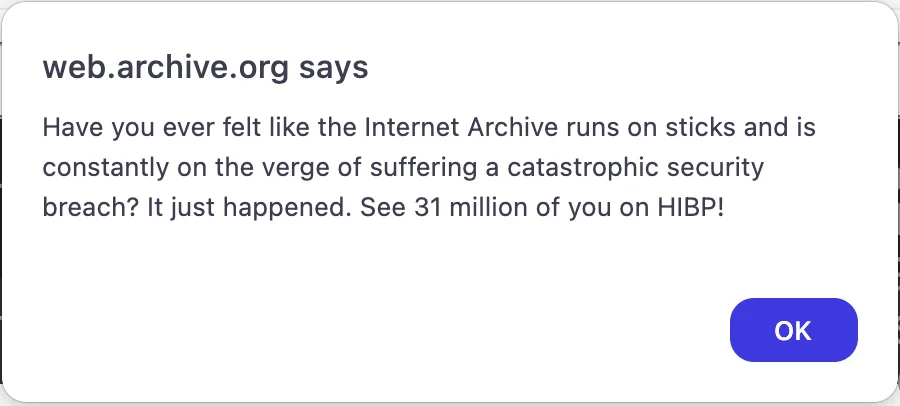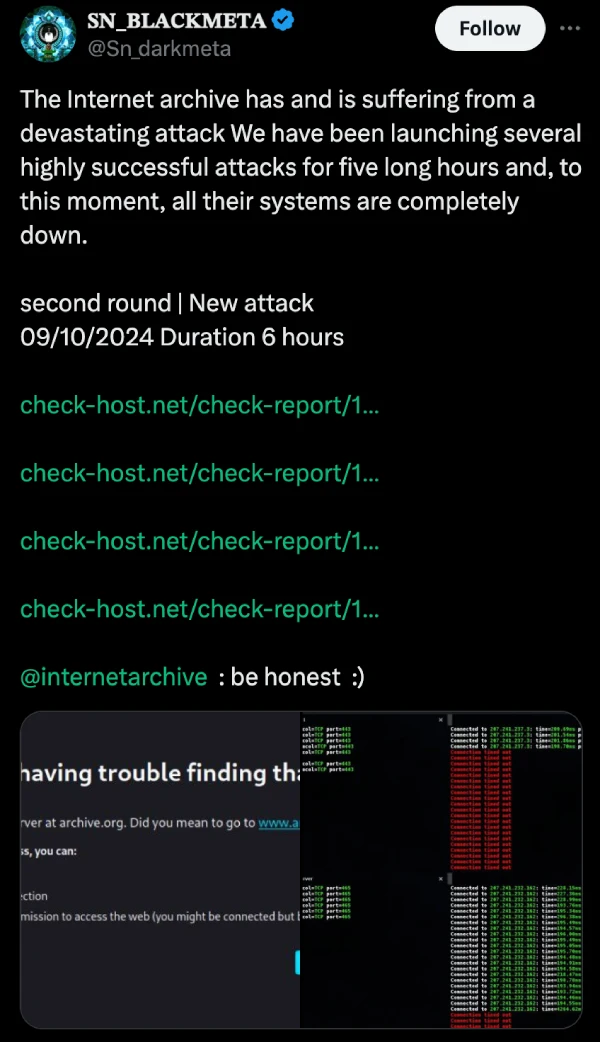The @internetarchive’s Wayback Machine resumed in a provisional, read-only manner.
— Brewster Kahle (@brewster_kahle) October 14, 2024
Sorry, no Save Page Now yet.
Safe to resume but might need further maintenance, in which case it will be suspended again.
Please be gentle https://t.co/sb5tlvxQ26
More as it happens.
Update 21/10/24 10:54 am (IST): The Verge reports that hackers still have access to the organization’s internal emailing tools and have been using them to reply to user support tickets. These replies mock the Internet Archive’s security practices and claim that hackers have access to user data submitted through those tickets.
The Internet Archive is slowly recovering from the attack and has brought some services back online, but a significant portion of its data archive remains inaccessible. The reason for the attack is still unknown.
Original article published on October 10, 2024, follows:
Update 15/10/24 10:54 am (IST): After going dark for a few days, Internet Archive’s Wayback Machine is now functional again. The founder says the ‘Save Page Now’ feature isn’t available yet, and there might still be further maintenance which would lead to suspension of the service again.
Original article published on October 10, 2024, follows:
The Internet Archive has suffered a significant breach impacting 31 million accounts. On Wednesday, visitors to the site were met with a pop-up alert announcing a “catastrophic security breach,” which was later confirmed by Internet Archive founder Brewster Kahle. The website was also defaced and subjected to a distributed denial-of-service (DDoS) attack, which has caused disruptions for days.
The pop-up message, loaded through a compromised JavaScript library, read: “Have you ever felt like the Internet Archive runs on sticks and is constantly on the verge of suffering a catastrophic security breach? It just happened. See 31 million of you on HIBP!”
“HIBP” refers to Have I Been Pwned?, a service where users can check if their data has been exposed in a breach. The operator of HIBP, Troy Hunt, confirmed to BleepingComputer that he received a file containing the email addresses, screen names, password change timestamps, Bcrypt-hashed passwords, and other data of 31 million unique users. Hunt verified the data’s authenticity through multiple sources.
Let me share more on the chronology of this:
— Troy Hunt (@troyhunt) October 9, 2024
30 Sep: Someone sends me the breach, but I'm travelling and didn't realise the significance
5 Oct: I get a chance to look at it - whoa!
6 Oct: I get in contact with someone at IA and send the data, advising it's our goal to load…
The breach has left the Internet Archive scrambling to address the attack. Kahle posted on X, confirming the breach and explaining that the team had disabled the compromised JavaScript library and is working on improving security measures. The DDoS attack, which had been ongoing for days, has also complicated the recovery process.
What we know: DDOS attack–fended off for now; defacement of our website via JS library; breach of usernames/email/salted-encrypted passwords.
— Brewster Kahle (@brewster_kahle) October 10, 2024
What we’ve done: Disabled the JS library, scrubbing systems, upgrading security.
Will share more as we know it.
According to archivist Jason Scott, there were no clear demands from the attackers, who appeared to be acting simply “because they can.”
A group claiming responsibility, BlackMeta, hinted at further attacks to follow, escalating concerns over the site’s future stability. The attack is particularly alarming given the scale of data compromised, and many affected users are awaiting further updates.
As the Internet Archive works to bring its services back online, you should consider monitoring your account on Have I Been Pwned to check if your information has been exposed.
TechIssuesToday primarily focuses on publishing 'breaking' or 'exclusive' tech news. This means, we are usually the first news website on the whole Internet to highlight the topics we cover daily. So far, our stories have been picked up by many mainstream technology publications like The Verge, Macrumors, Forbes, etc. To know more, head here.




